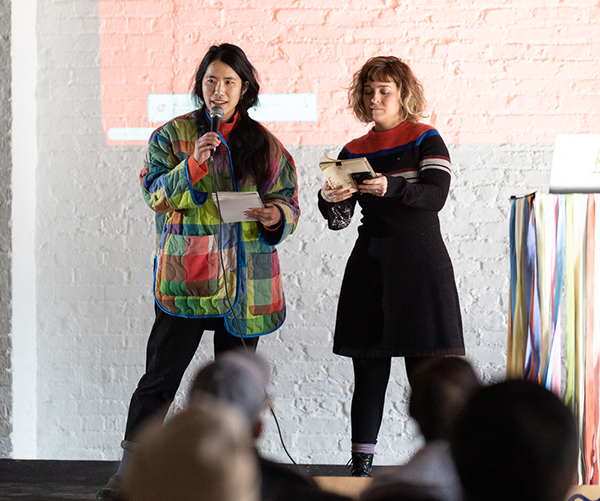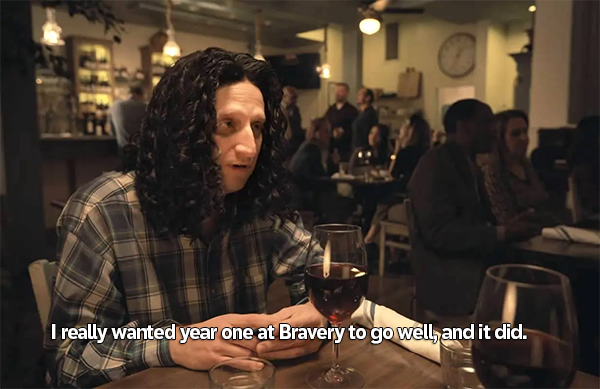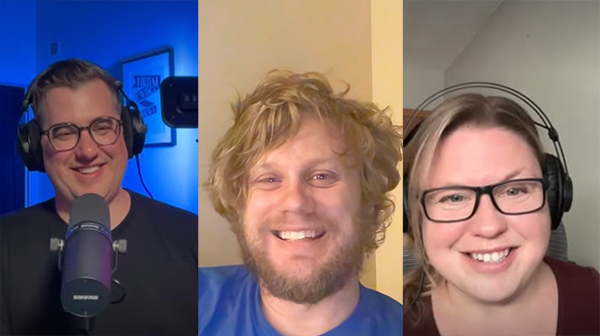Reflections from year one at Bravery

Are you all subscribed to Creative Mornings? It’s a newsletter for creative professionals. They host monthly events nearly nationwide for all kinds of creatives to meet and mingle. They share fun articles and podcast episodes.
I bring it up because this is Annie Yi’s last week writing and editing their newsletter. And she wrote this lovely goodbye message. Here’s an excerpt:
When I started this job in 2021, I was completely burnt out from a corporate job where work became increasingly abstract to me during the mind-numbing first year of the pandemic. More frustratingly, while the mission of my previous organization was (and still is) meaningful, the chasm between what I did and who I wanted to be only grew wider every day. This fueled a great deal of shame. When I started to tentatively tap the keys about creativity, I felt something click into place. Finally, I was doing work that felt aligned to my deepest held values. Writing to you all did more than change my relationship to work; it allowed me to heal. Plus, did I ever dream that there’d be a job that would REWARD my habit for having 500 tabs open at a time? I did not. So know this: soul-affirming work is out there, and it is waiting for you.

I’ve just hit the one-year mark of being full-time at Bravery. And that fact, in combination with reading Annie’s letter, made me think, “I don’t need to wait until I am leaving to take stock of what I’ve learned and what I am most grateful for at Bravery.” So, here’s a bit of a hodge-podge list of things I’ve either discovered about myself or have come to appreciate during year one at Bravery.
- I love higher education, but working at a higher education institution was the wrong fit for me at this stage in my career.
For years, I job-hopped across an institution looking for my fit. And in some cases (shout out to my ASR, Usability Services, and the Office of Professional Development peeps), I found amazing people and great, fulfilling work. Despite some of the awesome things, I kept trying to move up and take on new challenges and responsibilities. But, in reality, I was really rearranging my professional furniture, so to speak. I’d bring my toolkit of skills and stretch in different ways, but I wouldn’t really grow the way I needed to.
Additionally, I never quite figured out how to sit still in the politics of institutional life. Organizational politics make me antsy. And, my goodness, higher education is filled to the brim with organizational politics.
Now, I work for an agency that doesn’t operate in that resource-strapped, hierarchical structure, and it feels wildly different. Don’t get me wrong: there are plenty of ups and downs and stresses. But they’re not the same kind of stress. I found the clarity and trust I’d been looking for at Bravery, and it’s been a huge sigh of relief and a giant leap in professional growth.
- As I mentioned in my last hot take, institutions of higher education are remarkably resilient and adaptable.
For young adults, higher education is often their first foray into institutional life because, before college, they’ve had their parents within arms reach, making many of their institutional decisions for them. That’s why higher education has historically been a political wedge issue and continues to be one today - it’s an institution actively shaping our future in ways other institutions are only attending to the present. When an institution suffers from too many imaginations-run-wild, it can feel like the sky is falling any minute now.
However, the institutions I’ve had the pleasure to work with this year are responding to our world’s trends and shocks with energy and enthusiasm. They’ve suffered setbacks like anyone else. And they’ve had to change in uncomfortable ways. But there haven’t been any “throwing in the towel” moments. Over the next few years, you will hear a lot of doomsayers predicting higher education’s demise, but I wouldn’t start writing an obituary for our institutions as we know them just yet.
- Our jobs train us to see the world in a certain way.
A few years ago, I was reading this book on Never Trumpers by Robert P. Saldin and Steven M. Teles. The book analyzes the types of conservatives who didn’t want Trump as president based on their career dispositions (national security professionals, political operatives, public intellectuals, lawyers, and economists). The book quietly asserts that we take on very distinct habits of mind based on the industry we work in and how we routinely solve problems in our professional environments. It’s almost like a special career bias.
If you spend 40 hours a week for years specializing in thinking through problems inside a bureaucratic world with complicated business processes, tight grips on decision-making authority, and passionate mission-driven individuals under nebulous institutional guidance, you have special tools at your disposal. But those tools don’t work as well outside your industry. And they sometimes prevent you from seeing more creative solutions.

I came to Bravery with a lot of practiced risk aversion, resource scarcity talk, and overall cynicism. In the year I’ve been with Bravery, I’ve started to shed some of these institutional habits I developed. And I am hopefully gaining new ones to expand my creative thinking.
- And, the thing I appreciate most about Bravery is… (drum roll please)
For years, I worked in different roles where my supervisors and leaders were suspicious of work friendships. I think some of them saw work friendships as potential distractions at best. And, I think others saw work friendships as a quietly dangerous proletariat uprising in their midst.
But, I have always known in the depths of my soul that working with people you love is ferociously motivating. Friendships keep me grounded, inspire trust, make the risks fun, and make the foxholes survivable.
They say that if you’re having fun, you’ll never work a day in your life. And I find that platitude to be utter garbage. Work is still work. The thing is, I want to work. I love the feeling of contributing something meaningful to others. There are a few key elements to work that give it that satisfying feeling. And, for me, it’s sharing in the turmoil and the accomplishments. Having people that really get me and support me, and probably see my potential better than I can, are special to me. Sometimes, I think they even get to see sides of me that my family doesn’t.
I consider my colleagues at Bravery brilliant friends worth doing great work with. Every work day, they make me laugh, they inspire me, they teach me more than I could learn in any classroom, and they appreciate me too. For that, I am extremely grateful.

I think, if I remember, I’m going to try to do this every year in the first-ish week of August. So, cheers to year one!